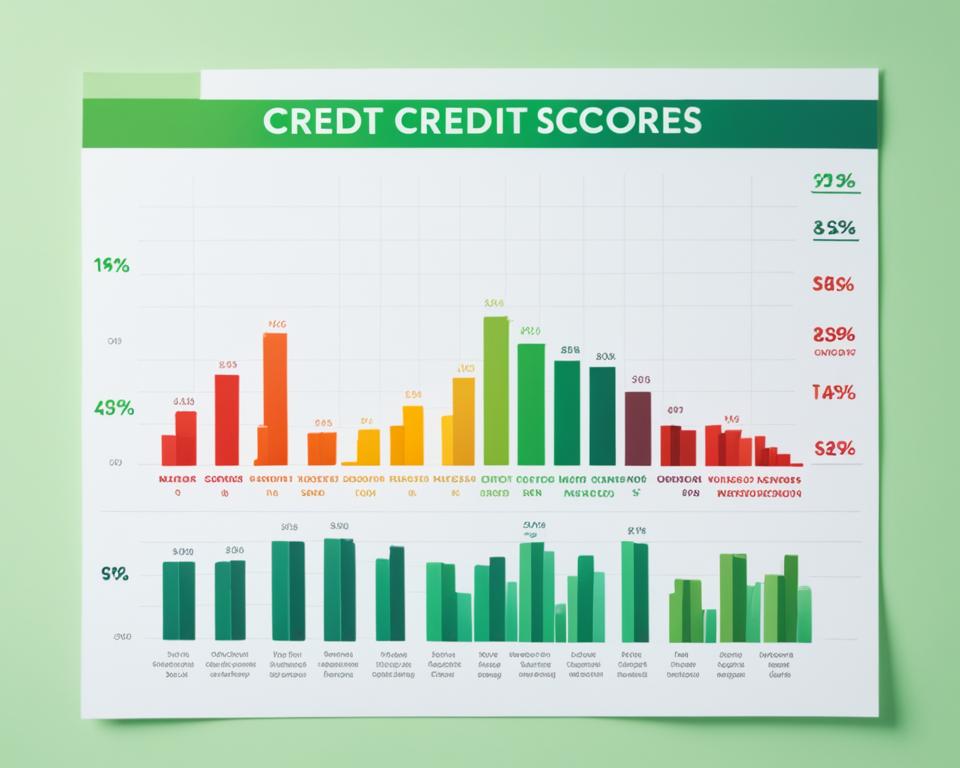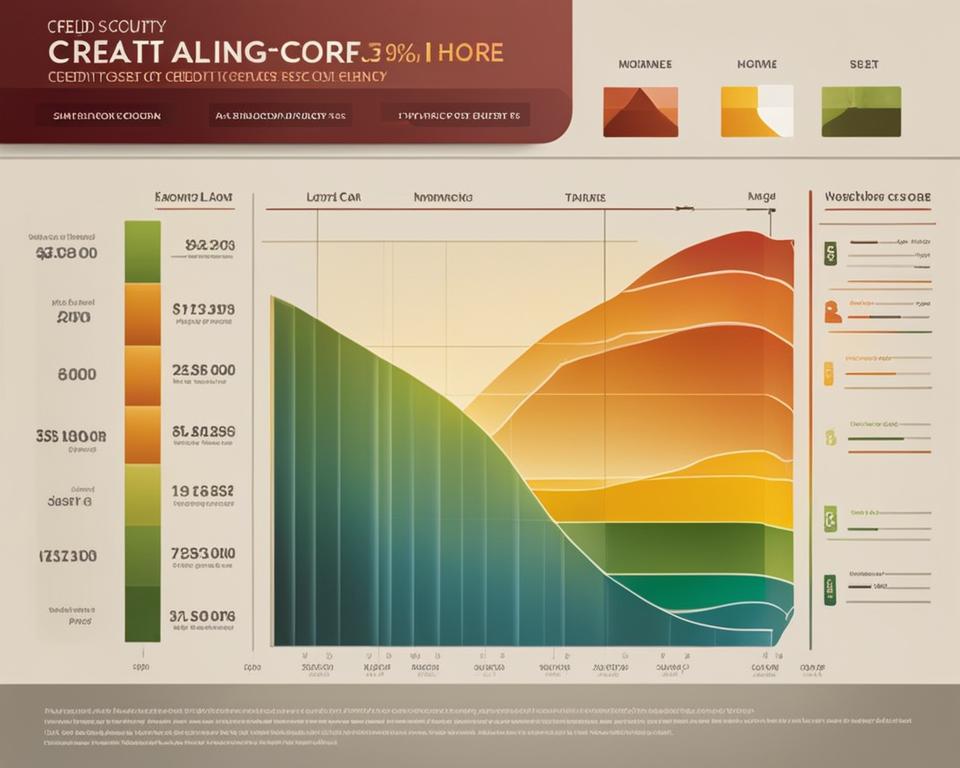Your credit score plays a crucial role in the homebuying process. It is a numerical representation of your creditworthiness based on your credit history and financial behavior. Many potential homebuyers are often curious about the minimum credit score required to qualify for a mortgage. While credit score is an important factor, it is not the sole determinant of mortgage approval or the terms of your loan.
When assessing mortgage applications, lenders consider a range of factors, including income, employment history, debt-to-income ratio, down payment amount, and the type of mortgage. These factors, along with your credit score, collectively influence the lender’s decision. However, it is generally recommended to have a credit score of around 620 or above to qualify for most mortgages.
If you are applying for a government-backed loan, such as an FHA loan, the credit requirements may be lower compared to conventional loans. FHA loans often allow borrowers with credit scores as low as 500 to qualify, depending on the lender’s discretion. Keep in mind that a higher credit score can increase your chances of securing more favorable loan terms and interest rates.
Key Takeaways
- A credit score of around 620 is generally the minimum requirement for most mortgages.
- Government-backed loans, like FHA loans, may have lower credit requirements.
- Boosting your credit score before buying a house can help you qualify for better loan terms.
- Lenders also consider factors such as income, employment history, debt, and down payment.
- Consulting with a mortgage loan officer can help you navigate the process and find the best home loan option for your specific situation.
Factors That Affect Mortgage Approval
Lenders consider multiple factors when assessing mortgage eligibility. While credit score is an important consideration, it is not the sole determining factor. Lenders evaluate various aspects of the borrower’s financial profile to make an informed decision.
- Credit Score: Your credit score is a significant factor in mortgage approval. It provides lenders with an indication of your creditworthiness and financial responsibility. A higher credit score typically demonstrates a lower risk for lenders, increasing the likelihood of mortgage approval.
- Income: Lenders evaluate your income to determine your ability to make mortgage payments on time. A stable and sufficient income is crucial for loan approval.
- Employment History: Your employment history reflects stability and reliability. Lenders prefer borrowers with a consistent work history, as it indicates a steady income source.
- Debt-to-Income Ratio: Lenders calculate your debt-to-income ratio to assess your ability to repay the mortgage. This ratio compares your monthly debt obligations to your gross monthly income.
- Loan Amount Requested: The loan amount you request influences mortgage approval. Lenders carefully evaluate the loan-to-value ratio, which compares the loan amount to the appraised value of the property.
While credit score plays a vital role, it is essential to recognize that lenders evaluate multiple factors when determining mortgage approval. It’s crucial to maintain a good credit score, demonstrate a stable income, and manage your debts responsibly to improve your chances of getting approved for a mortgage.
| Factors Affecting Mortgage Approval | Importance |
|---|---|
| Credit Score | High |
| Income | High |
| Employment History | Medium |
| Debt-to-Income Ratio | High |
| Loan Amount Requested | Medium |
Understanding the factors that affect mortgage approval allows you to focus on areas of improvement to enhance your chances of qualifying for a home loan. It’s essential to maintain a good credit score, establish stable income, and manage your debts responsibly to demonstrate financial reliability to lenders.
Credit Score Requirements for Different Loan Types
When it comes to buying a house with bad credit, understanding the credit score requirements for different loan types is essential. While a low credit score may make it challenging to qualify for a traditional mortgage, there are loan options available that cater to borrowers with less-than-perfect credit.
In this section, we’ll explore the credit score requirements for various loan types, including conventional loans, FHA loans, VA loans, USDA loans, and jumbo loans.
Conventional Loans
Conventional loans are offered by private lenders and typically require a higher credit score compared to other loan options. To qualify for a conventional loan, borrowers generally need a credit score of at least 620.
FHA Loans
Federal Housing Administration (FHA) loans are designed to assist borrowers with lower credit scores and smaller down payments. FHA loans have more lenient credit requirements, allowing borrowers with scores as low as 500 to qualify with a 10% down payment or a score of at least 580 with a 3.5% down payment.
VA Loans
VA loans are available to active and veteran military personnel and their families. While the Department of Veterans Affairs does not set a minimum credit score requirement, most lenders prefer a score of at least 620 for VA loan approval.
USDA Loans
USDA loans are guaranteed by the U.S. Department of Agriculture and are intended to promote rural development. While the USDA does not set a minimum credit score requirement, most lenders prefer a score of at least 640 for approval. However, some lenders may consider lower scores with additional credit analysis.
Jumbo Loans
Jumbo loans are mortgages that exceed the conforming loan limits set by Fannie Mae and Freddie Mac. Due to the higher loan amount and increased risk, most lenders require a credit score of at least 700 for jumbo loan approval.
Understanding the credit score requirements for different loan types can help you assess your eligibility and explore the best options available. Remember that credit scores are just one aspect of the mortgage application process, and other factors such as income, employment history, and down payment also play a role in loan qualification.
It’s important to consult with a mortgage professional who can guide you through the options and help you find the right loan for your specific needs and circumstances.
Credit Score and Conventional Loans
When it comes to buying a house, conventional loans are a popular choice. Unlike government-backed loans, such as FHA or VA loans, conventional loans are not backed by a government agency. Instead, they are offered by commercial banks and lending institutions.
One of the key factors that lenders consider when approving a conventional loan is the borrower’s credit score. While the specific credit score requirements may vary depending on the lender, most lenders typically require a minimum credit score of at least 620 for a conventional loan.
However, it’s important to note that some lenders may have additional requirements for borrowers with lower credit scores. These requirements could include a higher income or a larger down payment to compensate for the perceived risk associated with a lower credit score.
Having a higher credit score can benefit borrowers in multiple ways. It not only increases the chances of loan approval but can also result in more favorable loan terms, such as a lower interest rate. This can potentially save borrowers thousands of dollars over the life of their loan.
Here is a table summarizing the credit score requirements for conventional loans:
| Credit Score Range | Minimum Credit Score Requirement |
|---|---|
| Excellent (760 and above) | No specific requirement, but borrowers may qualify for the best rates and terms |
| Good (700-759) | No specific requirement, but borrowers may qualify for favorable loan terms |
| Fair (620-699) | Minimum credit score requirement for most lenders |
| Poor (Below 620) | Lenders may have additional requirements, such as a larger down payment or higher income |
It’s important to keep in mind that credit score is just one aspect of the mortgage approval process. Lenders also consider other factors, such as income, employment history, and debt-to-income ratio, when making their decision. So, even if your credit score falls within the required range, it’s a good idea to ensure that your overall financial profile is strong.
Credit Score and FHA Loans
FHA loans are backed by the Federal Housing Administration and are designed to assist borrowers with lower credit scores and smaller down payments. These loans offer more flexibility for homebuyers with less-than-perfect credit.
While the minimum credit score requirement for an FHA loan is 500, most lenders prefer a score of at least 580 for borrowers to qualify with a 3.5% down payment. This higher credit score threshold increases your chances of getting approved and may result in more favorable terms.
With an FHA loan, you can take advantage of the reduced credit score requirement while still enjoying the benefits of homeownership. Whether you have a limited credit history or have faced credit challenges in the past, an FHA loan can be a great option for financing your dream home.
It’s important to note that even with an FHA loan, lenders still consider other factors such as income, employment history, and debt-to-income ratio when evaluating your mortgage application. While credit score is a significant factor, it’s not the sole determining factor.
Building a positive credit history and demonstrating responsible financial behavior can help improve your credit score and increase your chances of getting approved for an FHA loan. By paying your bills on time, keeping your credit card balances low, and managing your debts wisely, you can work towards achieving a higher credit score.
“FHA loans provide an excellent opportunity for homebuyers with lower credit scores to fulfill their dreams of homeownership. These loans offer more flexibility and can be a stepping stone towards improving your credit over time.” – John Davis, Mortgage Loan Officer
If you’re considering applying for an FHA loan, it’s recommended that you consult with a reputable mortgage loan officer who specializes in FHA loans. They can guide you through the process, help you understand the specific credit score requirements, and assist you in finding the best loan option for your unique situation.
FHA Loan Benefits:
- Lower credit score requirements compared to conventional loans.
- Smaller down payment options, with 3.5% down for borrowers with a credit score of at least 580.
- More lenient qualification criteria.
- Potential for lower interest rates.
- Allows for non-traditional credit history and alternative credit sources.

Credit Score and USDA Loans
When it comes to buying a house in rural areas, USDA loans can be a great option. These loans are guaranteed by the U.S. Department of Agriculture and are designed to promote rural development. If you’re considering a USDA loan, it’s essential to understand the role your credit score plays in the approval process.
While the USDA does not set a minimum credit score requirement for their loans, most lenders prefer borrowers to have a credit score of at least 640 to qualify. A higher credit score demonstrates to lenders that you are a responsible borrower and increases your chances of loan approval. However, it’s important to note that some lenders may consider applicants with lower credit scores if they undergo additional credit analysis.
Having a good credit score not only improves your chances of getting approved for a USDA loan but can also help you secure more favorable loan terms, such as a lower interest rate. Before applying for a USDA loan, it’s a good idea to check your credit score and take steps to improve it if necessary. This can include paying bills on time, reducing your debt-to-income ratio, and avoiding new credit applications.
Benefits of USDA Loans for Homebuyers
USDA loans offer several advantages to homebuyers, particularly those looking to purchase a property in rural areas. Here are some key benefits of USDA loans:
- No down payment: One of the most significant advantages of USDA loans is that they often require no down payment. This can make homeownership more affordable and accessible for buyers without substantial savings for a down payment.
- Favorable interest rates: USDA loans typically offer competitive interest rates, making them an attractive option for borrowers. A lower interest rate can save you thousands of dollars over the life of your loan.
- No private mortgage insurance (PMI): Unlike many other loan types, USDA loans do not require private mortgage insurance. This can result in lower monthly mortgage payments and save you money over time.
- Flexible credit requirements: While a good credit score is beneficial, USDA loans have more lenient credit requirements compared to conventional loans. This can be advantageous for borrowers with less-than-perfect credit.
- Support for rural communities: By choosing a USDA loan, you’re contributing to the development of rural areas and supporting local communities. These loans are specifically designed to help boost rural economies and provide housing opportunities in underserved areas.
It’s important to note that USDA loans have specific eligibility criteria beyond credit score requirements. These include income limits based on the location of the property and the number of people in your household. Additionally, the property you intend to purchase must meet certain criteria to qualify for a USDA loan.
Before deciding on a USDA loan, it’s recommended that you consult with a mortgage loan officer who can guide you through the application process and provide personalized advice based on your financial situation and homeownership goals.
Credit Score and VA Loans
VA loans are a special type of mortgage offered to active and veteran military personnel and their families. These loans are guaranteed by the U.S. Department of Veterans Affairs and provide unique benefits for those who have served our country.
When it comes to credit score requirements for VA loans, the U.S. Department of Veterans Affairs does not have a minimum credit score requirement. However, it’s important to note that individual lenders may have their own credit score requirements in order to approve a VA loan.
While the VA does not set a specific minimum credit score, most lenders prefer borrowers to have a credit score of at least 620 for VA loan approval. This score demonstrates a level of financial stability and responsibility, increasing the likelihood of loan approval.
Having a credit score of 620 or higher not only satisfies the lender’s requirements for a VA loan, but it may also enable borrowers to secure more favorable loan terms, such as a lower interest rate. This can result in significant savings over the life of the loan.
Why Do Lenders Consider Credit Score for VA Loans?
Lenders consider credit score as an indicator of the borrower’s creditworthiness and ability to repay the loan. While the VA guarantees the loan, lenders still want to ensure that they are lending to borrowers who are financially responsible and capable of making their mortgage payments on time.
A higher credit score demonstrates a track record of responsible credit management and financial stability. It shows that the borrower has a history of paying their debts on time and managing their finances effectively. This is important for lenders when evaluating the risk associated with offering a loan.
Therefore, even though the VA does not have a specific credit score requirement, having a good credit score can increase the likelihood of loan approval and help borrowers secure more favorable loan terms.

The Benefits of VA Loans
VA loans offer several advantages to eligible borrowers, which contribute to their popularity. These benefits include:
- Flexible credit requirements: While most lenders prefer a credit score of at least 620 for VA loan approval, the credit requirements are generally more lenient compared to conventional loans.
- No down payment: VA loans often allow borrowers to purchase a home with no down payment. This can be a significant advantage for those who may not have the funds for a large down payment.
- No private mortgage insurance (PMI): Unlike conventional loans, VA loans do not require borrowers to pay for private mortgage insurance. This can save borrowers hundreds of dollars each month.
- Lower interest rates: VA loans typically offer competitive interest rates, which can result in lower monthly mortgage payments compared to other loan options.
VA loans are a valuable resource for those who have served in the military or are currently serving. They provide unique benefits and opportunities for homeownership. While a credit score of at least 620 is generally preferred by lenders, individuals should consult with a mortgage loan officer to understand the specific credit score requirements for VA loans.
Credit Score and Jumbo Loans
When it comes to buying a high-value property, you may need a jumbo loan. Jumbo loans are mortgages that exceed the conforming loan limits set by Fannie Mae and Freddie Mac. Due to the larger loan amount and increased risk, most lenders have stricter requirements, including a higher credit score.
To qualify for a jumbo loan, most lenders typically require a credit score of at least 700. This higher credit score demonstrates your financial responsibility and ability to manage larger loan amounts. Lenders want to ensure that borrowers can repay these substantial loans effectively.
Having a credit score of 700 or higher not only increases your chances of approval for a jumbo loan but can also potentially result in more favorable loan terms. A higher credit score can lead to lower interest rates, saving you money over the life of the loan.
If you’re considering a jumbo loan, it’s essential to understand the credit score requirements and work on improving your credit score if necessary. A strong credit score can not only help you qualify for a jumbo loan but also open doors to other financial opportunities.
Key Points:
- Jumbo loans exceed conforming loan limits set by Fannie Mae and Freddie Mac
- Most lenders require a credit score of at least 700 for jumbo loan approval
- A higher credit score can lead to more favorable loan terms
- Consider improving your credit score before applying for a jumbo loan
Understanding Your Credit Score and Mortgage Rates
Your credit score is a critical factor that mortgage lenders consider when determining the interest rate you qualify for on your home loan. A higher credit score generally leads to a lower interest rate, which can potentially save you thousands of dollars over the life of your mortgage. Even a slight difference in your credit score can have a significant impact on your monthly mortgage payments.
When you have a higher credit score, lenders see you as a responsible borrower who is less likely to default on your loan. As a result, they are willing to offer you a lower interest rate, which translates into lower monthly payments.
“A higher credit score may not only save you money on your monthly payments, but it can also help you qualify for a larger loan amount or better loan terms.”
For example, let’s say you are purchasing a home with a 30-year fixed-rate mortgage for $300,000. With a credit score of 760, you may qualify for an interest rate of 3.5%. On the other hand, if your credit score is 640, you may be offered an interest rate of 4.5%. The difference in interest rates may seem small, but over the life of the loan, it can result in significant savings.
To illustrate the potential impact of credit scores on mortgage rates and payments, consider the following table:
| Credit Score | Interest Rate | Monthly Payment |
|---|---|---|
| 760+ | 3.5% | $1,347 |
| 700-759 | 3.75% | $1,389 |
| 680-699 | 4% | $1,432 |
| 660-679 | 4.25% | $1,476 |
| 640-659 | 4.5% | $1,520 |
As you can see from the table, even a moderate decrease in credit score results in a higher interest rate, which directly impacts your monthly payment. This emphasizes the importance of maintaining a good credit score before applying for a home loan.
It’s worth noting that mortgage rates can fluctuate based on market conditions, so credit score requirements and interest rates may vary. However, having a higher credit score will always put you in a better position in securing favorable loan terms.
Improving your credit score before buying a house can help you qualify for a lower interest rate and save you money over the life of your mortgage. Paying bills on time, reducing credit card debt, and keeping your credit utilization ratio low are some effective ways to boost your credit score. Consulting with a mortgage lender can provide you with personalized advice on improving your credit score and securing the best mortgage rates available.

Remember, your credit score is not the only factor that determines mortgage rates. Lenders also consider other aspects, such as your income, employment history, and debt-to-income ratio. By understanding how credit scores affect mortgage rates and taking steps to improve your creditworthiness, you can increase your chances of obtaining a competitive interest rate and achieving your homeownership dreams.
Improving Your Credit Score Before Buying a House
If your credit score is lower than desired, there are steps you can take to improve it before buying a house. By taking proactive measures, you can increase your chances of qualifying for a favorable home loan.
Here are some strategies to help boost your credit score:
- Check Your Credit Report: Review your credit report for any errors or inaccuracies that may be negatively impacting your score. Dispute any incorrect information and work towards resolving any outstanding debts.
- Become an Authorized User: If you have a family member with a good credit history, ask them to add you as an authorized user on their credit card. This can help establish positive credit behavior and increase your score.
- Pay Your Bills on Time: Consistently paying your bills on time is one of the most effective ways to improve your credit score. Set up automatic payments or reminders to ensure timely payments.
- Pay Down Credit Card Debt: High credit card balances can negatively impact your credit utilization ratio. Aim to pay down your credit card debt to below 30% of your available credit limit.
By implementing these steps, you can gradually improve your credit score over time, making you more attractive to lenders when applying for a home loan.
Remember, improving your credit score is a journey that requires patience and consistency. Start early and give yourself enough time to see significant improvements before starting the homebuying process.
Additional Factors Considered by Lenders
When evaluating mortgage applications, lenders take into account various factors beyond just the credit score. These factors provide a more comprehensive view of the borrower’s financial situation and repayment capacity. In addition to creditworthiness, lenders assess the following:
1. Income
The borrower’s income is a critical consideration for lenders. It helps determine the individual’s ability to make mortgage payments. Lenders typically analyze income stability, consistency, and the likelihood of continued employment. A steady and sufficient income demonstrates financial responsibility and increases the chances of securing a home loan.
2. Debt-to-Income Ratio
The debt-to-income (DTI) ratio compares the borrower’s monthly debt payments to their gross monthly income. Lenders analyze this ratio to determine the borrower’s ability to manage debt and afford additional mortgage payments. A lower DTI ratio indicates less financial strain and a higher likelihood of mortgage approval.
3. Down Payment
The down payment amount plays a significant role in the mortgage approval process. A larger down payment demonstrates financial stability and reduces the lender’s risk. It also lowers the loan-to-value (LTV) ratio, which can result in more favorable loan terms. A substantial down payment can compensate for a lower credit score and increase the likelihood of loan approval.
4. Employment History
Lenders evaluate the borrower’s employment history to gauge job stability and financial security. A consistent employment record indicates a reliable income source and suggests a lower risk of defaulting on mortgage payments. Typically, lenders look for a stable work history with at least two years of continuous employment.
“Lenders consider various factors such as income stability, debt-to-income ratio, down payment, and employment history to assess the borrower’s financial situation and repayment capacity.”
By considering these additional factors along with the credit score, lenders can make a more informed decision regarding mortgage approval. Each factor contributes to the overall assessment of the borrower’s financial health and their ability to handle the financial responsibilities of homeownership.
It’s essential for borrowers to understand these factors and strive to maintain a strong financial profile when applying for a home loan.
See the table below for a comprehensive comparison of the factors considered by lenders:
| Factors Considered by Lenders | Importance |
|---|---|
| Credit Score | High |
| Income | High |
| Debt-to-Income Ratio | High |
| Down Payment | High |
| Employment History | Medium |
 Understanding the additional factors considered by lenders is crucial in securing mortgage approval. By carefully managing one’s credit score, income, debt-to-income ratio, down payment, and employment history, aspiring homeowners can increase their chances of obtaining a home loan.
Understanding the additional factors considered by lenders is crucial in securing mortgage approval. By carefully managing one’s credit score, income, debt-to-income ratio, down payment, and employment history, aspiring homeowners can increase their chances of obtaining a home loan.
The Importance of Down Payment
While credit score is crucial, the size of your down payment can also impact your ability to qualify for a mortgage. A larger down payment can compensate for a lower credit score and increase the likelihood of loan approval. Lenders may offer better terms and lower interest rates for borrowers with a substantial down payment.
When you make a larger down payment, it demonstrates financial responsibility and reduces the lender’s risk. It shows that you have the financial means to save and invest in your home, making you a more attractive candidate for a home loan. Lenders are more likely to approve your mortgage application if you can provide a significant down payment, even if your credit score is not ideal.
By making a larger down payment, you can decrease the loan amount you need to borrow. This translates to a lower loan-to-value ratio, which is the percentage of the home’s value that you are financing with the loan. A lower loan-to-value ratio reduces the lender’s risk and can result in more favorable loan terms, such as lower interest rates and potentially no requirement for private mortgage insurance (PMI).
Additionally, a larger down payment can help you build equity in your home more quickly. Equity is the difference between the current value of your home and the remaining balance on your mortgage. It represents ownership in your property and can be used to access funds through a home equity loan or line of credit in the future.
By making a substantial down payment, you can:
- Improve your chances of qualifying for a mortgage
- Secure better loan terms, including lower interest rates
- Avoid or reduce the need for private mortgage insurance
- Build equity in your home faster
Example Down Payment Scenarios
To understand the impact of down payment on a mortgage, consider the following scenarios:
| Down Payment | Loan Amount | Interest Rate | Monthly Payment |
|---|---|---|---|
| 5% ($15,000) | $285,000 | 4.25% | $1,402.68 |
| 20% ($60,000) | $240,000 | 3.75% | $1,111.71 |
| 25% ($75,000) | $225,000 | 3.50% | $1,010.29 |
“As shown in the table above, a larger down payment reduces the loan amount, resulting in a lower monthly payment. For example, with a 5% down payment, the monthly payment is $1,402.68. However, with a 25% down payment, the monthly payment decreases to $1,010.29. This highlights how a substantial down payment can significantly impact your affordability and overall financial flexibility.”
Credit Score Comparison and Payment Examples
Different credit score ranges can result in significant differences in monthly mortgage payments. Higher credit scores generally qualify for lower interest rates, leading to lower monthly payments and less interest paid over time. Various credit score ranges and their corresponding APRs and payment examples can help illustrate the potential impact on mortgage affordability.
| Credit Score Range | APR | Monthly Payment Example |
|---|---|---|
| Excellent (760-850) | 3.0% | $1,265 |
| Good (700-759) | 3.5% | $1,324 |
| Fair (640-699) | 4.0% | $1,387 |
| Poor (580-639) | 4.5% | $1,449 |
| Bad (below 580) | 5.0% | $1,512 |
As seen in the table above, having an excellent credit score within the range of 760-850 can result in a significantly lower APR of 3.0% and a monthly payment example of $1,265. On the other hand, having a bad credit score below 580 can lead to a higher APR of 5.0% and a higher monthly payment example of $1,512.
This demonstrates the importance of maintaining a good credit score to qualify for more favorable mortgage terms and payments. By working towards improving your credit score, you can increase your chances of securing a home loan with lower interest rates and more affordable monthly payments.
Importance of Building and Maintaining Good Credit
Building and maintaining a good credit score is essential not only in the homebuying process but in various other aspects of your financial life. A good credit score can open doors to better loan terms, lower interest rates, and more favorable financial opportunities. It is a reflection of your financial responsibility and trustworthiness in the eyes of lenders.
With a high credit score, you are more likely to qualify for a home loan and secure competitive interest rates. This could potentially save you thousands of dollars over the life of your mortgage. Lenders view borrowers with good credit as less risky, allowing them to offer more attractive loan terms and conditions.
By practicing responsible credit management, you can establish a solid credit history that helps you achieve your homeownership goals. Here are some key strategies to build and maintain good credit:
- Pay your bills on time: Consistently making timely payments on your credit cards, loans, and other bills demonstrates your reliability as a borrower.
- Keep credit card balances low: Avoid maxing out your credit cards and aim to keep your credit utilization ratio below 30%. This shows that you can manage credit responsibly and not rely heavily on borrowed funds.
- Monitor your credit report: Regularly check your credit report for errors or discrepancies that could negatively impact your score. Dispute any inaccuracies promptly to maintain an accurate credit history.
- Diversify your credit mix: Having a good mix of credit accounts, such as credit cards, installment loans, and a mortgage, shows your ability to handle different types of credit responsibly.
- Avoid unnecessary credit applications: Limit opening new credit accounts unless necessary. Multiple credit inquiries within a short period can lower your credit score.
Building and maintaining good credit takes time and discipline, but the long-term benefits are worth it. Your credit score not only impacts your ability to buy a house but also affects eligibility for other types of loans, rental applications, insurance premiums, and even potential job opportunities.
Remember, a high credit score is not just a number; it represents your financial stability and reliability. Take proactive steps to build and maintain good credit, and it will pay off in the form of better financial opportunities and a brighter future.
Conclusion
When it comes to buying a house, your credit score is undeniably important. However, it is essential to remember that it is not the sole factor that lenders consider. The minimum credit score required to buy a house can vary depending on the type of loan and the specific requirements of lenders.
While keeping a good credit score is crucial, it’s also necessary to focus on other aspects of your financial profile. Factors such as your income, employment history, and down payment also play a significant role in the mortgage approval process.
To ensure you make the most informed decisions, it’s vital to understand your credit score and work towards improving it if necessary. Consulting with a mortgage loan officer can provide valuable guidance and help you navigate the complexities of obtaining a home loan. They can help you explore different loan options and find the one that best suits your specific needs and financial situation.
FAQ
How much credit score is needed to buy a house?
The minimum credit score required to buy a house varies depending on the type of loan and the lender’s requirements. Generally, a credit score of around 620 is the minimum requirement for most mortgages. However, government-backed loans like FHA loans may have lower credit requirements.
What factors affect mortgage approval?
Lenders review multiple factors to determine mortgage eligibility, including credit score, income, employment history, debt-to-income ratio, and the loan amount requested. While credit score is important, other factors such as income, employment history, and debt are also considered to assess your ability to make mortgage payments on time.
What are the credit score requirements for different loan types?
The credit score requirements for different loan types can vary. Conventional loans typically require a credit score of at least 620, while FHA loans allow borrowers with scores as low as 500 to qualify with a 10% down payment or 580 with a 3.5% down payment. VA loans have no minimum credit score requirement, but most lenders prefer a score of at least 620.
What is the credit score requirement for conventional loans?
Conventional loans, which are not backed by a government agency, typically require a credit score of at least 620. However, some lenders may have additional requirements, such as a higher income or a larger down payment, for borrowers with lower credit scores.
What is the credit score requirement for FHA loans?
FHA loans, backed by the Federal Housing Administration, are designed to assist borrowers with lower credit scores and smaller down payments. The minimum credit score requirement for an FHA loan is 500 with a 10% down payment, but most lenders prefer a score of at least 580 with a 3.5% down payment.
What is the credit score requirement for USDA loans?
USDA loans, guaranteed by the U.S. Department of Agriculture, are intended to promote rural development. While the USDA does not set a minimum credit score requirement, most lenders prefer a score of at least 640 for approval. However, some lenders may consider lower scores with additional credit analysis.
What is the credit score requirement for VA loans?
VA loans, offered to active and veteran military personnel and their families, do not have a minimum credit score requirement set by the Department of Veterans Affairs. However, most lenders prefer a score of at least 620 for VA loan approval, although individual lenders may have their own credit score requirements.
What is the credit score requirement for jumbo loans?
Jumbo loans, which exceed conforming loan limits, often require a credit score of 700 or higher due to the higher loan amount and increased risk involved.
How does credit score affect mortgage rates?
Your credit score plays a significant role in determining the interest rate you qualify for on your mortgage. A higher credit score generally results in a lower interest rate, potentially saving you thousands of dollars over the life of your loan.
How can I improve my credit score before buying a house?
If your credit score is lower than desired, you can take steps to improve it. These include checking your credit report for errors, becoming an authorized user on a family member’s credit card, paying your bills on time, and paying down credit card debt.
What other factors do lenders consider when evaluating mortgage applications?
In addition to credit score, lenders also consider other factors such as income, debt-to-income ratio, down payment, and employment history when evaluating mortgage applications.
How does the down payment size impact mortgage approval?
The size of your down payment can impact your ability to qualify for a mortgage. A larger down payment can compensate for a lower credit score and increase the likelihood of loan approval. Lenders may also offer better terms and lower interest rates for borrowers with a substantial down payment.
How do different credit score ranges affect monthly mortgage payments?
Different credit score ranges can result in significant differences in monthly mortgage payments. Higher credit scores generally qualify for lower interest rates, leading to lower monthly payments and less interest paid over time. This can help make homeownership more affordable.
Why is building and maintaining good credit important?
Building and maintaining good credit is important not just for the homebuying process, but for various other financial opportunities as well. Good credit opens doors to better loan terms, lower interest rates, and more favorable financial options.





